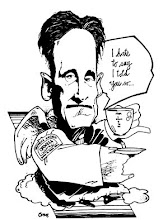Ian Kellas’ Peace for Beginners, success in the excellent Writers and Readers series and proof that, in today’s world, comic books are a more effective medium than catechism lessons.
There is a danger with this kind of presentation that complex issues will be over-simplified, yet the author handles his subject so that the format enhances the argument and never debases it. Kellas is refreshingly original in his treatment, pinpointing the contradictions within peace movements and identifying non-violence firmly among mainstream beliefs,
Any discussion on human behaviour comes down to a question of nature versus nurture. Is violence instinctive or man-made? Ethnology provides many examples sufficiently explain the distinct character of human violence, ‘humans with their practices of mass murder are different. They have an element of choice’.
Why, given the choice, do we consistently opt for violent solutions? Because the way in which choice is conditioned - by attitudes, values and social organisation - has led to a common tendency to form exclusive groups and to seek power over others. Ironically, conflict is only exacerbated by human ingenuity - excused in terms of religion or politics, made more effective through technological advances.
Does this mean non-violence and political power are impossible to reconcile? Kellas’ potted history reveals that when religious-based peace movements came into contact with the state the result was less of an accommodation than a hijack by opportunist rulers. Ambiguous doctrines which recognised ‘we shall always see Truth in fragments and from different angles’ (Gandhi) were open to cynical manipulation. even the justification of war. Hence the spectacle of Gandhi’s funeral, when the prophet of non-violence was carried to his burial on a gun carriage and his assassin hanged.
If divine intervention failed to bring peace on earth, science and the age of enlightenment did little better, The idea that Society could be governed by rules akin to Natural law led to a belief that rational government would end such irrational activities as war, allowing free trade between nations to continue unhindered. However the utilitarians’ ‘business as usual’ approach overlooked the fact that warfare was as much the concern of industrialists as of princes. Today the human obsession with groups and power continues unabated, except the groups are larger and the stakes much higher.
Superficially, Peace for Beginners is a fun book designed to whet the reader’s appetite. Yet the real value of the book is not the superb graphic work but the written content. Perhaps because history favours victors rather than losers it is too easy to forget the contribution to non-violence made by its early proponents. This in turn has allowed critics to misrepresent today’s peace campaigners as cranky or alien to tradition. Ian Kellas has done his bit to set the picture right and to provoke questions rather than provide answers to the present nuclear threat.
Brian Attwood
31 March 2010
Subscribe to:
Post Comments (Atom)








No comments:
Post a Comment